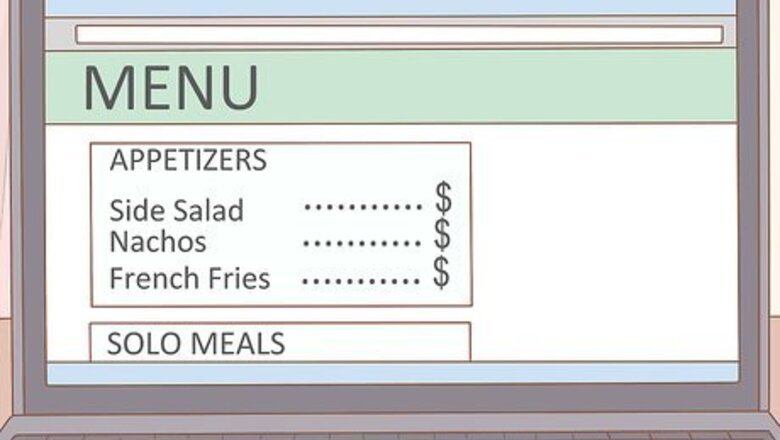
views
Ordering in Person
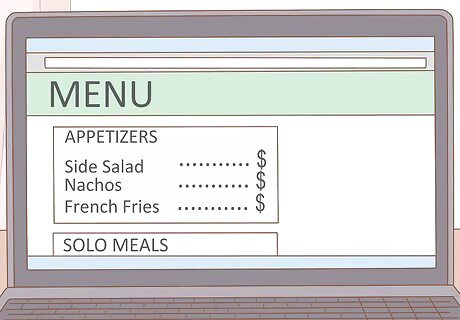
Look up the menu before you go out. Most restaurants post their menus online. Knowing what you want before you get to the restaurant will help to minimize your anxiety when you actually order. Look up unfamiliar words or dishes that might trip you up. This will help you to feel more confident when you order. If you don't know what pepperoncinis are, for example, a quick Google search will save you from having to ask someone later. You can even use your smartphone to look up menu items when you're at the restaurant if you don't know what they are. Always plan a back-up order. Restaurants run out of items sometimes, so it's a good idea to have a second meal choice in mind. This way, if your first choice isn't available for some reason, you don't have to worry about figuring out what you want instead. Look for possible follow-up questions. Does that meatloaf come with a choice of sides, for example? Do you get to choose what kind of cheese or sauce comes on your burger? Read the menu carefully when you're planning your order so you won't be caught off guard by any questions your server asks. Write down your order and bring it with you to the restaurant so that you don't forget it.
Read reviews about the restaurant's food. Looking at reviews on sites like Google and Yelp can offer you other's thoughts on specific dishes, as well as pictures. Look up some reviews for the restaurant before you go out so that you can get a better sense of what you may and may not like.

Rehearse your order. Practice making your order a couple of times in front of a mirror or with a friend. Preparing and practicing your order in advance will help you to feel more confident when you place your order in real life. Practice feeling relaxed while you order. If you force your brain to think positively while you practice, it will be may be easier to do so during the real thing. If you feel yourself getting anxious as you practice, try some deep breathing.
Visualize yourself ordering successfully. When you practice ordering, visualize the outcome you want. Let your brain play through the scenario after you've ordered so that you can see yourself successfully getting your food. This can be a powerful tool to help redirect focus from worst-case scenario moments toward more positive outcomes. If, for example, you are preparing to order at a counter, go through the whole process in your head. Close your eyes and imagine yourself walking up to the counter, clearly and concisely placing your order, getting your order number, and then walking away.
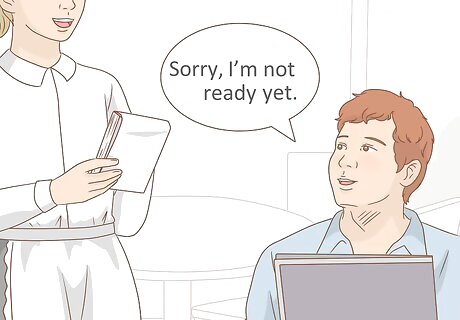
Ask your server for more time if you need it. If you feel yourself becoming anxious, it's okay to tell the person taking your order that you're not ready yet. Take all the time you need to feel comfortable before ordering.
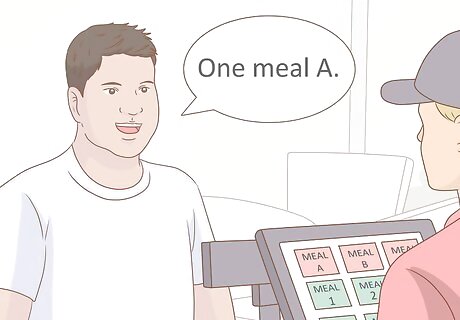
When you're comfortable, place your order. Be as straightforward as you can. Try to remember to smile (even if you still feel nervous). Be prepared to answer any questions the person taking your order might have. Even the best-planned out order might need clarification. Remember that when the person taking your order asks a question, it's not because you did something wrong—they just want to make sure your order is exactly what you want. They want to make sure you're happy and comfortable. If you don't know how to pronounce the name of the item you want, it's okay to point at the item on the menu. It's also okay to order the item by number rather than by name, if menu items are numbered.
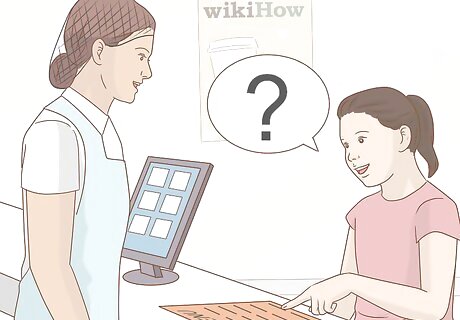
Don't be afraid to ask questions. The person who takes your order is happy to answer any questions you have about the menu because they want to make sure that you will be happy with what you order. If you don't know what something on the menu is, you are probably not the first. If you have a smartphone you can also Google any unfamiliar menu items.

Don't sweat your mistakes. Nobody is perfect—and nobody expects you to be perfect, either. If you do make a mistake, remind yourself that you're not the first one to make it, and you probably won't be the last! The key is to accept the mistake and let it go. Focus on the next thing you have to do instead. It's okay if you mispronounce the name of an item—if the menu has lots of items with foreign names, you are definitely not the first person to make this mistake! Most order-takers hear mispronunciations regularly, and they won't judge you for it.
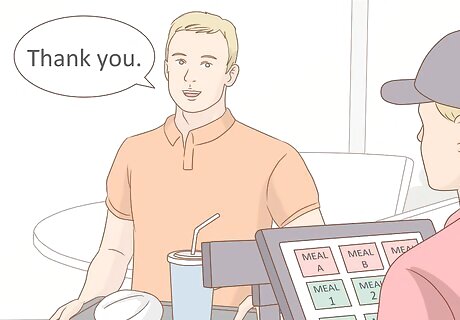
Receive your food. Don't let your nerves get the best of you—always smile and thank the person who brought your food. Check over the food to make sure it's right and if it's not, make sure you let the person who brought it know. Don't let your anxiety stop you from enjoying your meal!
Choosing an Alternative Way to Order
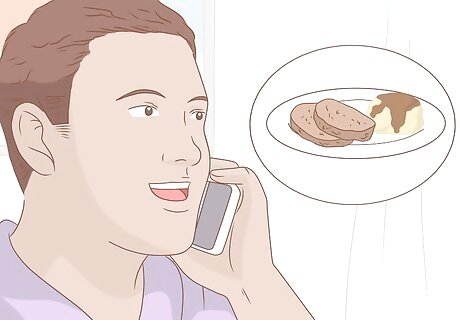
Order over the phone. If you want to pick up your food or have it delivered, ordering over the phone is the way to go—whether you have social anxiety or not. But ordering over the phone can induce similar levels of anxiety to ordering in person. Just remember that the more you practice ordering this way, the less anxious you will feel. You might want to rehearse your order before you call. Rehearsing in front of a mirror or with a friend will help you to feel more comfortable during the real thing.
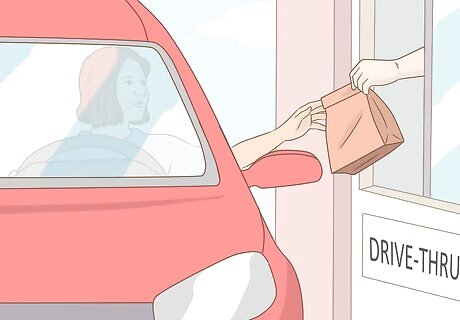
Go through a drive-thru. If you have trouble with face-to-face interactions, a drive-thru might be a good way to lessen your anxiety. Keep in mind, though, that you will still have to speak with people at a drive-thru. If you are comfortable talking but don't like face-to-face interactions, a drive-thru could help you. If you get uncomfortable talking to strangers in any way, a drive-thru may not be a strong alternative for you. Drive-thrus let you order from the comfort of your car, which can help some people feel more safe and comfortable. Drive-thrus also minimize the amount of time you spend waiting to order, which can take away some of the pressure of figuring out your order and ordering correctly. You also don't have to worry about what others in line may think.

Ask a friend to order for you. If you are going to be eating with other people, this can be a good way to get around your anxiety. Make sure that you communicate exactly what you want to your friend so that they don't order the wrong thing. Write down your order if it's complicated. Keep in mind that ordering this way will not be very helpful to you in overcoming your anxiety in the long run.
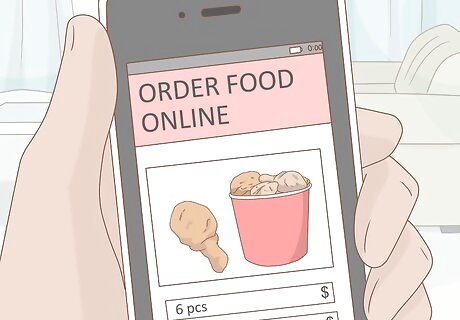
Use an app or order online. Many restaurants have online ordering services these days, either through the restaurant's website, downloadable apps, or third-party services like Zifty and GrubHub. These services can cut down on person-to-person interaction a great deal, although you will still have to interact with someone when you receive your food. Remember that using these services will not help you to overcome your anxiety in the long run. Online ordering generally takes longer than in-person or over-the phone ordering. Most online ordering services require a credit or debit card, and they often charge an extra fee. Restaurant apps allow you to place your order and pay for it ahead of time. They will also notify you when your food is ready. Make sure you have your phone with the app on it with you when you pick up your food.

Receive your food. Don't let your nerves get the best of you—always smile and thank the person who brought your food. Check over the food to make sure it's right and if it's not, make sure you let the person who brought it know. Don't let your anxiety stop you from enjoying your meal! If you have to pick up your food at a restaurant, there is a chance that the food may not be ready yet, so make sure you have something to occupy your time, like a book or magazine, in case you have to wait. This will help to keep from getting anxious while you wait. If you have to meet a delivery person at the door, don't be nervous. Keep your thoughts realistic—this person has many deliveries to make and is just as interested in keeping the conversation short as you are. Having your money and tip ready ahead of time will make this more seamless.
Managing Social Anxiety
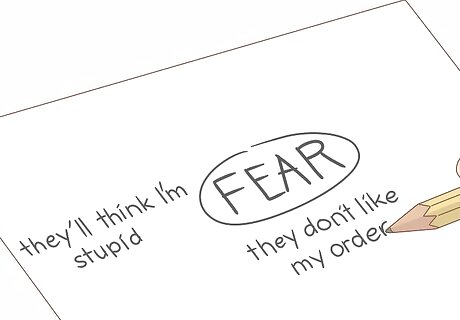
Map out your anxiety as you're preparing to order. Ask yourself what, exactly, you are afraid of. It might help to write down your fears. After you've established your specific concerns, take some time to analyze those worries. Ask yourself how realistic the fear is. Are you afraid that your server will think that what you ordered is stupid? Ask yourself how likely it is that your server will single your order out when they take similar orders all day long. Remember that other people are not as focused on you as you are. Put your fears in perspective. If your server doesn't like your order, does it really matter? If you're bored while your food is being made, will that hurt you in the long run? Think of ways to prevent your fears from happening. If you're worried, for example, that you will feel uncomfortable while you wait for your food, think of a way to avoid that—like bringing a book or magazine along with you. Remember that your anxieties about what might happen are not facts. They are guesses about the future—often unlikely worst-case scenarios. Try to think of a more likely scenario. For example, rather than being disgusted by your order, your server is more likely to write it down and deliver it to the cook without thinking much about it at all.

Practice some simple relaxation techniques if you get nervous. Even if you get nervous at the restaurant, there are some simple things you can do to relax which won't draw any attention to you. If you're feeling overwhelmed, it's okay to tell your server that you need a moment. Steady your breathing. If you feel yourself getting anxious when it's time to order, try breathing in and out slowly through your nose. When you're anxious, you breathe faster. Taking slow, steady breaths through your nose helps signal to your body that there's no need to be anxious. Relax your muscles. You can do this by tensing different muscles in your body and then relaxing them. This signals to your body that it's time to relax and also helps your brain to focus on something other than your anxiety.

Think positively. When you catch yourself having negative thoughts about the situation, try to replace them with something positive. For example, if find yourself worrying that the cashier doesn't like the sound of your voice, remind yourself that it's just as likely that they think you've got a great voice. Remind yourself that you're not a mind reader. Assuming that others are thinking bad thoughts about you is just projecting your anxiety onto them. If you're going to make projections, assume that they're thinking something good about you. And remember that you can't control what others are thinking.
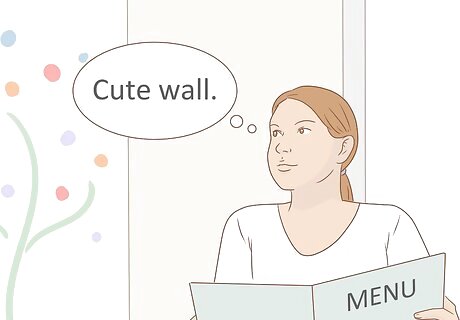
Focus your attention outward. When you focus all of your attention on yourself and your feelings, your anxiety is likely to build. Instead, try focusing on your surroundings. Try picking out details about your environment which are especially interesting. For example, you might try to decide which piece of decoration on the restaurant's walls you find most interesting. Then look for the table that has the most people at it and try to guess why they're all there. The key is to turn your focus completely away from yourself. If you're with other people, try asking them open-ended questions and then listening carefully to their answers. This has the added bonus of making your dining companions feel important and interesting.

Remember that the job of restaurant staff is to make you feel comfortable. The last thing in the world they want to do is cause you stress or unhappiness. They are probably just as concerned about your liking them as you are about their liking you!




















Comments
0 comment